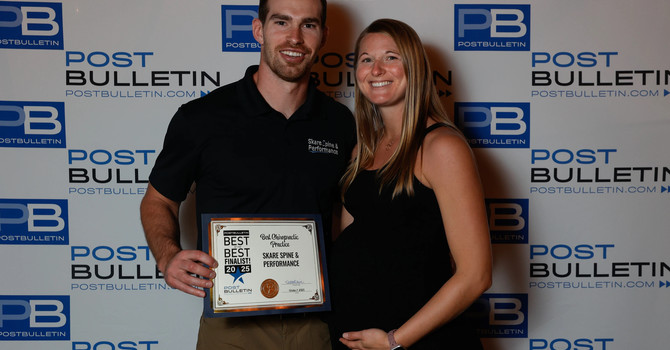
Frozen shoulder, also known as adhesive capsulitis, can turn everyday tasks into painful ordeals. This condition, characterized by stiffness, pain, and limited range of motion in your shoulder joint, can significantly impact your quality of life. At Skare Spine & Performance in Rochester, MN, we understand the frustration frozen shoulder can cause. In this blog, we'll explore the causes, symptoms, and, most importantly, effective strategies to help you cure frozen shoulder quickly and reclaim your shoulder's freedom.
What is Frozen Shoulder?
Frozen shoulder occurs when the connective tissue surrounding your shoulder joint (the shoulder capsule) becomes thickened, stiff, and inflamed. This leads to restricted movement and pain, making it difficult to reach overhead, behind your back, or even sleep comfortably.
Frozen shoulder typically progresses through three stages:
- Freezing Stage: Increasing pain and stiffness, making it harder to move your shoulder.
- Frozen Stage: Pain may lessen, but stiffness persists, significantly limiting your range of motion.
- Thawing Stage: Gradual improvement in range of motion and reduced stiffness.
What Causes Frozen Shoulder?
The exact cause of frozen shoulder remains somewhat of a mystery, but several factors can increase your risk:
- Age and Gender: It's most common in people between 40 and 60 years old, and women are more likely to develop it than men.
- Immobilization: Prolonged shoulder immobilization can increase the risk, such as after surgery or an injury.
- Underlying Conditions: Certain medical conditions like diabetes, thyroid disorders, and heart disease are associated with a higher risk of frozen shoulder. Blood work is often one of our first steps when someone presents with a frozen shoulder.
- Previous Injury: A prior shoulder injury can make you more susceptible to developing frozen shoulder.
How to Cure Frozen Shoulder Quickly: A Multifaceted Approach
While frozen shoulder often resolves on its own over time (1 to 3 years), the process can be slow, frustrating, and pailful. At Skare Spine & Performance, we offer a combination of therapies to accelerate healing and help you regain your shoulder's mobility faster.
Chiropractic Care:
- Adjustments: Gentle adjustments to the shoulder, neck, and upper back can help restore joint mobility and reduce nerve irritation.
- Manual Therapy: Hands-on techniques like mobilization and soft tissue release can improve range of motion and reduce stiffness.
Targeted Exercises:
- Range of Motion Exercises: Regularly performing gentle range of motion exercises is crucial to prevent further stiffness and regain mobility. Exercises that promote shoulder extension (like reaching behind your back) are often beneficial.
- Strengthening Exercises: Strengthening the muscles around your shoulder can improve stability and support.
Shockwave Therapy:
Research supports the use of extracorporeal shockwave therapy for frozen shoulder.
Shockwave therapy can help to:
- Accelerated Healing: Shockwave therapy utilizes acoustic waves to stimulate blood flow, reduce inflammation, and promote tissue regeneration, speeding up the healing process.
- Break Down Scar Tissue: It can help break down adhesions and scar tissue that may be restricting movement.
- Non-Invasive and Effective: Shockwave therapy is a non-invasive, drug-free option for treating frozen shoulder.
Other Therapies:
- Dry Needling: This technique can help release muscle tension, trigger points, and joint stiffness that may contribute to pain and limited range of motion.
Is Ice or Heat Good for Frozen Shoulder?
Generally, we advocate for heat with most musculoskeletal conditions. Heat may be your best option with the stiffness accompanying frozen shoulder.
Heat will help promote blood flow and loosen the shoulder joint and the muscles around it. With frozen shoulder, we want to get you moving it as much as possible, and heat can help increase mobility.
Do Neck Stretches Help Frozen Shoulder?
Yes, neck stretches can be beneficial for frozen shoulder, as stiffness in the neck can often contribute to shoulder pain and limited mobility. The cervical spine (neck) and the shoulder girdle are highly interrelated, so improving the function of the joints and muscles around the neck can help with shoulder pain and stiffness.
Gentle neck stretches, and range of motion exercises can help improve flexibility and reduce tension. Chin retractions, think making a double chin repeatedly, can help improve the mobility of the joints around the lower neck and upper back, which are often stiff in people with frozen shoulder.
The Importance of a Personalized Approach
At Skare Spine & Performance, we understand that every case of frozen shoulder is unique. We'll conduct a thorough evaluation to determine the best course of treatment for your specific needs.
Don't let frozen shoulder freeze your life. Schedule a consultation today and discover how we can help you regain your shoulder's freedom and get back to doing the things you love.

Nate Skare
Contact Me



